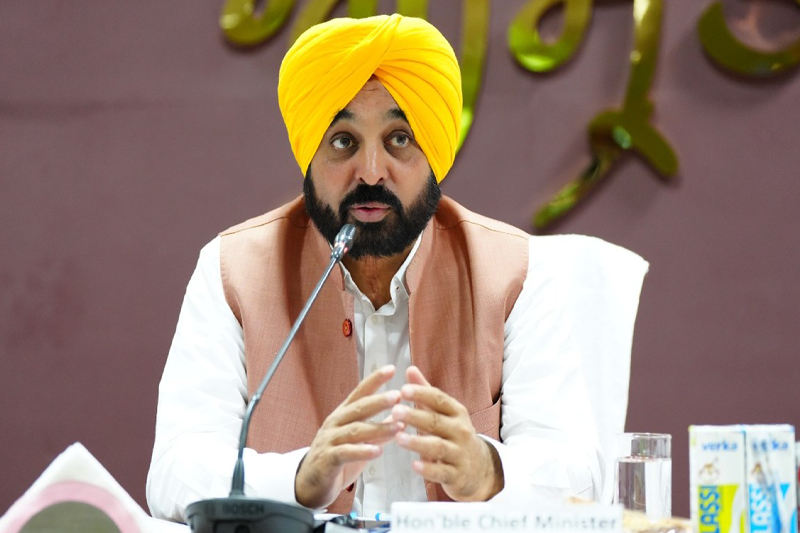
Punjab to Introduce Nation’s First Evidence-Based Anti-Drug Curriculum in Government Schools
In a significant move to combat substance abuse among youth, the Punjab government is launching a first-of-its-kind, evidence-based anti-drug curriculum in government schools across the state. The initiative is a major component of the ongoing campaign, Yudh Nasheyan Virudh (War Against Drugs), led by the Aam Aadmi Party (AAP) government.
Education Minister Harjot Singh Bains announced on Monday that this comprehensive program, aimed at students in Classes IX to XII, will officially be launched on August 1 in Arniwala, Fazilka, a border district in Punjab. The launch event will be led by Punjab Chief Minister Bhagwant Mann and AAP national convenor Arvind Kejriwal.
Reaching 8 Lakh Students Through Schools
The anti-drug education curriculum is expected to reach approximately eight lakh students in 3,658 government schools across the state. To ensure effective implementation, over 6,500 teachers have been trained to deliver the specially designed program.
Minister Bains emphasized that the fight against drug addiction must begin in classrooms, not police stations. “This is a foundational step towards long-term change. Our children must be empowered to make informed choices before they’re exposed to drugs,” he said.
A Curriculum Built on Scientific Evidence
What sets this curriculum apart is its scientific foundation. It was developed in partnership with J-PAL South Asia, an organization co-founded by Nobel Laureate Professor Abhijit Banerjee. The curriculum has been grounded in behavioral science and thoroughly tested through randomised controlled trials (RCTs) in Punjab during the 2024-25 academic year.
The pilot trials involved 9,600 students from 78 government schools in Amritsar and Tarn Taran districts. The results were compelling:
- 90% of participating students recognized that trying chitta (a synthetic drug) even once carries a high risk of addiction, compared to just 69% in the control group.
- Belief in the myth that addiction can be overcome by willpower alone dropped from 50% to 20% among those who completed the program.
“These results validate the curriculum’s effectiveness in altering misconceptions and enhancing awareness. Our goal is not just to educate, but to equip our students with the tools to resist real-world pressures,” said Bains.
Interactive and Practical Learning Modules
The curriculum will be delivered through 35-minute sessions every fortnight over 27 weeks. These sessions are designed to be engaging and practical, featuring:
- Documentaries
- Quizzes
- Posters
- Role plays
- Group activities
The content focuses on myth-busting, refusal strategies, and resisting peer pressure—key skills students need to avoid falling into substance abuse.
“This approach is not about preaching—it’s about participation. Students will actively engage in discussions and activities that help them internalize the dangers of drug use,” Bains explained.
A First for India
Punjab is making history by becoming the first state in India to implement a statewide, evidence-based drug prevention curriculum. While many states have taken punitive approaches to the drug crisis, Punjab’s initiative is unique in that it targets the root cause through education and prevention.
“Years of systemic neglect by past governments allowed the drug menace to deepen,” Bains said. “But today, Punjab is showing the country a new path—one based on science, prevention, and empowerment.”
Enforcement Efforts Continue
Alongside educational reforms, the state government has ramped up law enforcement actions. So far, over 23,000 drug peddlers have been arrested. Authorities have also seized properties linked to drug trafficking and confiscated more than 1,000 kilograms of heroin.
These steps form a two-pronged strategy: cracking down on supply chains while simultaneously reducing demand through youth education.
Looking Ahead
The launch of this program marks a pivotal shift in Punjab’s war on drugs. By embedding prevention into the education system, the government is focusing on long-term change, protecting the next generation before addiction takes hold.
Education Minister Bains concluded, “We are not just fighting a drug problem—we are building a movement of informed, resilient young people. This is the only sustainable way forward.”
With strong political backing, a scientifically validated curriculum, and broad institutional support, Punjab’s initiative may well serve as a national model for tackling drug addiction—starting from where it matters most: the classroom.



